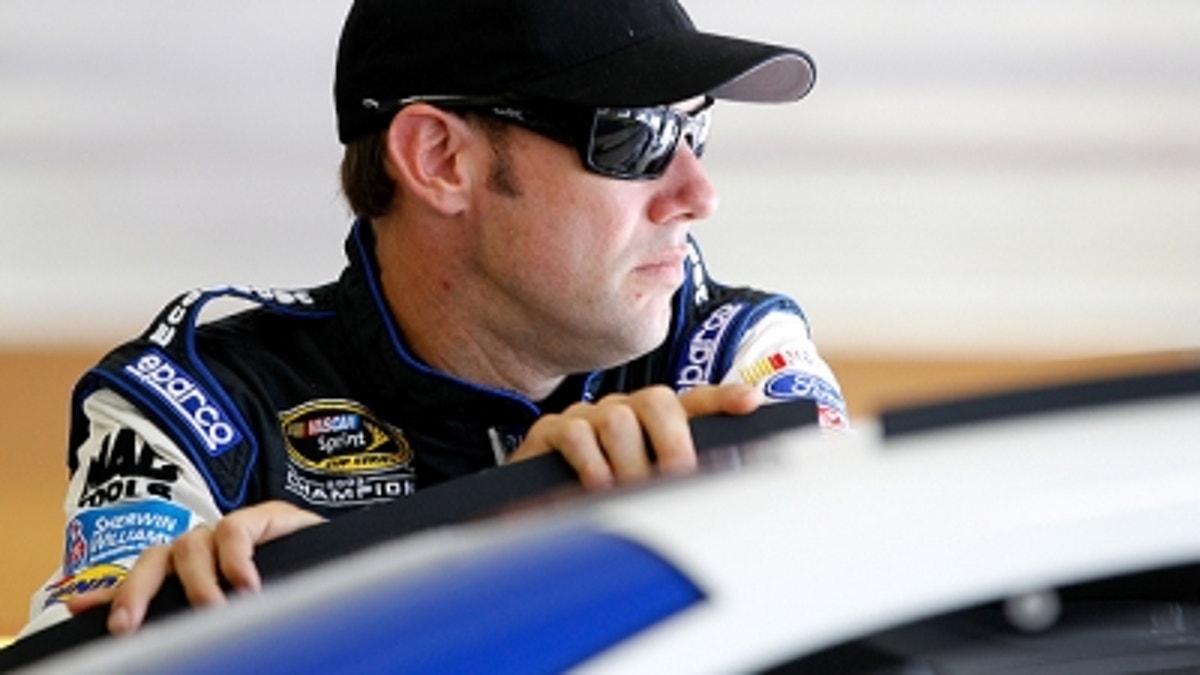
Joe Gibbs Racing has scheduled a Tuesday press conference to announce that Matt Kenseth will be joining the team next season to drive the No. 20 Toyotas.
Kenseth will fill the seat currently held by Joey Logano, who is pursuing other rides for next season.
Kenseth, 40, has raced virtually his entire Cup career for team owner Jack Roush. He will be replaced next season by Ricky Stenhouse Jr.
It is rare that a single moment defines a career, but it happened in Matt Kenseth’s case.
Kenseth was racing in the Nationwide (then Busch) Series in September 1998 when a telephone call carried his big break. Driver Bill Elliott’s father had died, and Elliott needed a substitute for the Sept. 20 race at Dover International Speedway in Delaware.
There it was. Kenseth’s shot.
Drivers can either shine or stumble in the white heat of the moment.
Kenseth sparkled.
Driving Elliott’s McDonald’s red No. 94 Ford, Kenseth ran a safe, sane race, jousted some with the leaders and finished sixth – behind Mark Martin, Jeff Gordon, Jeremy Mayfield, Bobby Labonte and Rusty Wallace. He was one of only nine drivers on the lead lap at the finish on one of NASCAR’s most punishing tracks.
Kenseth’s smooth drive raised eyebrows across the sport, and few were surprised when he was sitting in a Roush-owned Ford for five Cup races the next season. He made his full-season debut with Roush in 2000 and has been with the long-time Ford team owner since that season.
A steady driver who is rarely ruffled, Kenseth has accomplished something relatively rare in his decade-plus career – he has managed to become one of the sport’s superstars while also largely existing under the radar.
Quiet and generally non-confrontational (although he has had notable dustups with Jeff Gordon and Tony Stewart, among others), Kenseth has avoided the trappings that sometimes accompany other drivers at his accomplishment level. He doesn’t hide from the spotlight, but neither does he seek it. He’s content to run and win and enjoy the moment without creating a circus parade around everything.
Kenseth is fine with his status.
“It’s cool,” he said. “I can blend in. I meet a lot of really great fans everywhere, and I don’t feel like I’m being hassled. Katie (his wife) and I have never stopped leaving the track or going out to eat or whatever.
“I love it when we’re running good and everything’s going good. People are always agog over Dale (Earnhardt) Jr., but for me it’s usually related to performance. If we’re not running good, I can pretty much lay low and nobody really notices anything. If we’re running well and winning, I’m maybe a little more recognizable and there are more people around. It goes up and down, and sometimes it’s nice for it to be down.”
Although it’s seldom seen in public, Kenseth has a wry and dry sense of humor, one he’s built through 13 mostly successful seasons at the Sprint Cup level.
Kenseth has won at least one Cup race in all but three of his full-time seasons, and he has finished in the top 10 in points eight times. He’ll be a part of the Chase again this season.
He scored his lone championship in 2003, and his solid but unspectacular performance that season is one of the prime reasons, many observers say, in NASCAR’s decision to change its championship system from the one that had existed since 1975 to the Chase format that debuted in 2004. It was a revolutionary change in a sport that seldom makes them.
In winning the title in 2003, Kenseth did a masterful job of “points” racing; that is, he finished in the top 10 in a remarkable 25 of 36 races, although he won only once. He led the points for 34 straight weeks.
Kenseth outran Jimmie Johnson with relative ease for the championship. NASCAR officials decided they wanted more “flavor” and tighter racing down the stretch with television ratings on the line, so they developed a new format that tightened the standings for the final races of the season.
Kenseth hasn’t won the championship in the Chase era, but he was second in 2006 and fourth in 2007 and last season.
Kenseth began racing in and around his native Wisconsin after working on his father’s race cars as a teen-ager. He started driving at 16 and won his third race. He won numerous track titles in Wisconsin, and, in 1991, became the youngest driver to win an ARTGO Racing Series feature.
Kenseth jumped to the Nationwide Series in 1997, driving for a team owned by Robbie Reiser, who later would become his Sprint Cup crew chief at Roush Racing.
Kenseth’s Cup career generally has paralleled that of his good friend, Dale Earnhardt Jr. They competed for Sprint Cup Rookie of the Year honors in 2000. Kenseth finished 14th in points that season and won the rookie award. He also scored his first Cup victory that season, winning the Coca-Cola 600 at Charlotte Motor Speedway.
Kenseth sometimes is compared to retired Hall of Fame driver David Pearson, who often saved the best of his car for the final laps of races, becoming a lurker of sorts on the way to dozens of victories.
“One thing I always say about Matt,” said Mike Calinoff, Kenseth’s long-time spotter, “is that he’s the smartest guy on the race track. I’ve always said that. He knows what’s going on. He’s paying attention to everybody else’s strategy. He’s ahead of the curve all the time.”
Mike Hembree is NASCAR Editor for SPEED.com and has been covering motorsports for 30 years. He is a six-time winner of the National Motorsports Press Association Writer of the Year Award.
